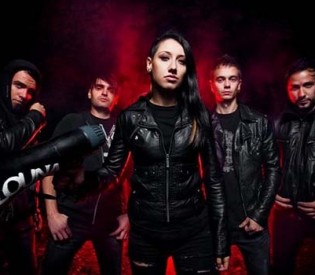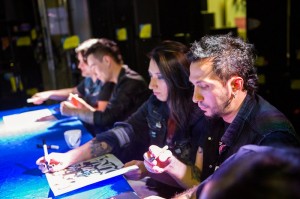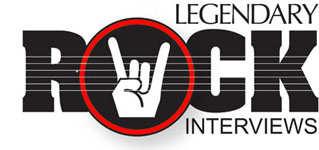Russian rockers Louna talk about rising in their local scene, leading to their worldwide quest and English speaking album

It’s not every day that a Russian hard rock/metal band ends up on the radar of an American music scribe but it is happening with a little more frequency now in 2013 given the American release of “Behind A Mask”, the new record from LOUNA. The band, fronted by the lovely, leather-throated Lousine Gevorkian, is rounded out by bassist Vitaly Demidenko, guitarists Rouben Kazariyan and Sergey Ponkratiev and Leonid “Pilot” Kinzbursky on drums and they have already made a huge dent in their homeland. LOUNA has become a huge draw in Russia and now are looking to turn even more heads with the additional exposure provided by the new “Americanized” album they’ve begun promoting. I recently was able to ask them all a few questions about everything going on, read on…
LRI: Hi guys!! Thanks for talking to us. I have not heard of LOUNA at all but was pleasantly surprised when I heard your new album “Behind A Mask”. This is very exciting, very radio ready rock and roll. Can you begin by telling us how you rose to such prominence in your homeland of Russia where you are a very big act?
Vitaly: It has all happened so fast that it’s hard to get away from that wild rushing feeling that seems like a rocket has just sent us up into the atmosphere. It started after we released our first album “Let’s Get Louder”. Prior to that we had been playing in small underground clubs for 30-60 people. Since then, in just 3 years, we have played in the biggest venues in Moscow and clubs with over 3,000 people. We didn’t use any promotional companies, we weren’t promoted on TV and only had radio rotation on one radio station network in Russia. You could say we’re almost like an independent non-profit rock band. We just wrote our music, recorded it, filmed some small videos and put on concerts. Now we’re headliners at the biggest Russian rock festivals sharing the same stage with legends of our country’s rock scene. It’s really been unbelievable for us.
LRI: The song “Mama” is phenomenal and describes your passion for rock and roll in terms that are VERY easy for an American audience to understand. We all remember the kids in Russia going crazy for the Moscow Music Peace Festival years ago and want to know, is American rock and roll still very popular in Russia? Do the audiences prefer music and lyrics in Russian?
Vitaly: The English version of Mama lists almost all of the same names of Western musicians and the other idols of our youth as in the Russian version of the song. Here in Russia, “Mama” is one of our biggest hits. People of all ages write to us about how this song makes them remember their youth and their favorite bands from when they were growing up. This leads me to believe that Russia, just like the rest of the world, still bases the formation of music tastse and outlook from the classic rock-n-roll all over the world. There are lot of people here who are religiously fanatic about having Russian lyrics in their music, but absolutely everybody here, even the most extreme Russian fans knows the songs of Metallica, Sex Pistols and Nirvana.
Rouben: I remember the summer of 1989 and I was just a small kid and my parents would not let me go to that gig. By that time I had already found (it was not an easy task in those days of the Soviet Union) tapes of Bon Jovi, Scorpoins, Motley Crue, Skid Row, Ozzy and even much heavier Megadeth and Slayer. Shall I say that it changed my life and I have never ever regretted it? Yes, I can say that. Mostly American and British music is what I have listened to through those years and that has formed the basis of what I write for Louna. I love American music! Bands like Pearl Jam or Incubus are quite hard to be understood by Russians because these bands represent different harmonies and melodies. But I really love it. The audience in Russia mostly prefers music in Russian, which is natural. But still…. western music is a big influence.
Lousine: Russian audiences are divided. There are people here who will not listen to anything not in Russian and then there are other people who will not listen to anything if it is in Russian. Some people appreciate the lyrics and some just the music itself. For me, I think the best combination is when the ideology from the lyrics and the music combine in equal shares and create something amazing. Otherwise it’s just trash.
LRI: From musicians I have spoken with Russia and Eastern Europe have some of the most beautiful people and passionate rock fans of all the places they tour. For those of us who have never been to your country what is the live music scene and nightlife like in Russia?
Pilot: Nightlife here is really well developed, I mean, if you’re into DJs and glamour shit!! The rock movement is different in that it is either feast or famine. We have only a few successful young bands and almost no media suppport.
Lousine: We have developed a lot and the rock scene is no exception. A lot of people probably find it hard to believe because they think we’re still a country with dancing bears roaming the streets and bottles of vodka in every hand. We have huge international rock festivals here just the same as anywhere else, with the exception that the military and police provide security without another option. It really spoils the atmosphere of the events but it’s our struggle and our problem.
LRI: The material on “Behind A Mask” combines some of the best songs from your first two albums previously released in Russia. I have not heard your original recordings but Lousine’s English-speaking vocals and delivery are phenomenal. I cannot speak or sing Russian so I cannot understand; how much of a challenge was it to actually re-work this material for an American audience?
Lousine: For me it wasn’t that hard because Travis did all of the really hard work from adapting our lyrics into English to working with me on my pronunciaiton. As for my pronunciation I think it’s been easier for me than it would have been for a lot of other Russian singers because I’m half Armenian and Armenians are known to easily absorb the subtleties of language if we put our minds to it. We can pick out the details easier and have more flexibility. Not sure why, but I’ve just noticed it throughout my life living in Russia. Russian and Armenian are really complex, complicated languages so I think knowing both has helped me to absorb other languages.
LRI: How much touring has the band done outside of Russia and are you looking forward to playing with different artists and seeing different audiences around the world in support of the new album release?
Rouben: So far we have only played Belorussia and Latvia, and we’re going to Ukraine in a few days, but mostly we have played just in Russia. But Russia is HUGE. Check out a map sometime and just see how many cities and towns there are to go out and play at!! With our new record we are hoping to breakthrough on the international scene. We are really excited about the possibilities to show our music, our culture and ourselves and to represent Rock and roll from Russia! Apart from Gorky Park over 20 years ago I do not know of any ROCK bands from our country that have played in the US other than just to Russian immigrants in small venues of a hundred or so people who didn’t speak English.
Vitaly: Despite the fact that we’ve already been on tour all over Russia, we’ve never really been outside of it except for some performances in old Soviet republics like Ukraine, Belarus and Estonia. Of course we’d love to put on concerts in other places and show the energy of Louna to people. I hope that our album will appeal not only to listeners but also to the promoters who are the ones who ultimately decide what people have a chance to listen to live in concert.

Lousine
LRI: Lousine is the frontperson of the band and obviously a lot of people appreciate her but the band itself is very strong and energetic. What do the other members of LOUNA bring to the band’s live show and recordings?
Vitaly: All of us give more than 100% at each of our shows. People who have seen our shows say that it reminds them of the devistation of a hurricane. People are affected by the extreme flow of energy, and rush to the stage. In the studio we also try to give at least a little taste of that on our recordings. When I write the bass lines I never sit, but I always instead stand up just like I would in a live show. We recently released a double live album and decided not to re-record any of the music in the studio but intead left every note of every song as it was live. You can find lots of videos of our performances online and you will understand if you do.
Pilot: First of all, we make music the same way that Queen did. We’re all humble people in that respect, and we each do our part for the group. The goal is to maximize the quality of the song without trying to worry about who gets the big solo or whatever.
LRI: How do the songs usually come together? Is the music usually something the band works on in the beginning and the lyrics come last or are the lyrical concepts the beginning of many of these tracks?
Rouben: Usually I’ll come up with a riff and take it to everybody then we’ll jam it. Once we get it to a point where it seems like a song then Lou will work on a vocal melody and Vit then works on lyrics. We keep working on it together until we’re happy with the arrangement. Sometimes Sergey will bring in his song ideas, or even Vit. We work together. All the Russian songs lyrics are written by Vit.

Louna doing a signing for fans
LRI: This is a very image driven and technology driven world. Do you interact with your fans both in person at shows and on the internet social media sites like Twitter or Facebook?
Vitaly: Probably too much!! We try to keep up on what’s happening on our social networks and especially on Facebook.
LRI: How important are the visual and theatrical elements of your live show and have you been influenced by bands like KISS or Alice Cooper who are entertaining both musically and visually?
Rouben: Not very much for me. Although I like Alice Cooper, Kiss and even Black Metal bands that use corpse paint and all sorts of theatrical stuff to enhance the live image of their music – I still think that it is not that important. Of course, you should not stand still and shred like Dream Theater (man, these guys are SMART-ed). I am more a fan of hardcore aesthetics in live shows, so I guess to a certain extent that also fits us.
Vitaly: We don’t stage visual effects other than maybe some lights behind us that a light tech will do, but we never do anything very seriously or consistently like some constant costume or face paint of anything like that. We are strongly against putting up some kind of false image of who we are. The main thing for us is the music and the lyrics. Our ideology is similar to street punk, hardcore and grunge, not glam rock or Japanese rock bands. Even Lou, as a girl, doesn’t dress up in special costumes. She just wears normal street clothes, ripped jeans, t-shirts and sneakers and maybe a leather jacket. On stage, we’re the same people as we are in real life.
LRI: Thanks again for taking the time to talk to LRI. I think the album is catchy as hell and if our readers love bands like Halestorm they will want to find your music and check it out for sure. Is there anything else you would like to say to your loyal fans or people who are just discovering your band at this moment?
Lousine: thanks for listening and reading and stay true! Listen to true music, rock music.
Band Website: www.LounaRocks.com
Facebook Page: www.Facebook.com/LounaRocks
Category: Interviews



